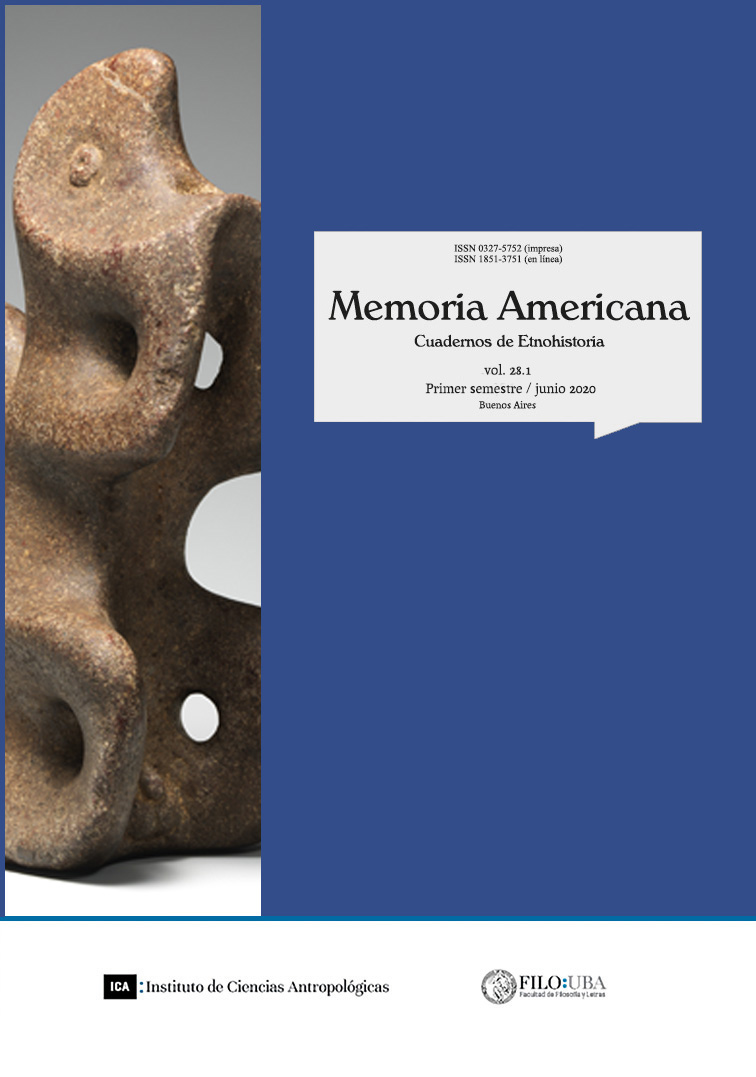Footprints of evolutionism in Uruguay’s proto-anthropological literature about Charruas in the turn of the century (1890-1911)
Abstract
Toward the end of the 19th century, evolutionist currents in anthropology were discussing the distance between “primitive” people from Western civilization. Unilineal evolutionism attributed to authors such as Edward Burnett Tylor or Lewis Henry Morgan asserted the controversial observation that “primitive” peoples possessed culture, disputing the separation between “savage” and “civilized” categories upon which Herbert Spencer’s influential ideas were built. These discussions permeated the world’s anthropologies and proto-anthropologies, including those in La Plata region. This article examines the influence of these debates in Uruguay by analyzing three influential texts about the Charrúa people during the transition from the 19th to the 20th century: José Henriques Figueira’s Los primitivos habitantes del Uruguay (1892), Francisco Bauzá’s Historia de la dominación española en el Uruguay, (1895) and Orestes Araújo’s Historia de los charrúas y demás tribus indígenas del Uruguay (1911).Downloads
References
Araújo, O. (1911). Historia de los Charrúas y demás tribus indígenas del Uruguay. Montevideo, Librería Cervantes.
Azpiroz, A. (2017). De “salvajes” a heroicos: la construcción de la voz y la imagen del “indio Charrúa” desde 1830 a los inicios del siglo XX. Almanack 16: 1-38.
Barrán, J. P. (1968). Latorre y el Estado uruguayo. Enciclopedia uruguaya 22: 21-39.
Bauzá, F. ([1895] 1965). Colección de clásicos uruguayos: Historia de la dominación española en el Uruguay. Tomo I. Montevideo, Biblioteca Artigas.
Briones, C. (2007). Teorías performativas de la identidad y performatividad de las teorías. Tabula rasa 6: 55-83.
Cabrera Pérez, L. e I. Barreto (1997). "Indios, frontera y hacendados en el sur de la Banda Oriental" en Behares, L. y O. Cures (eds.), Sociedad y cultura en el Montevideo colonial: 251-264. Montevideo, Facultad de Humanidades y Ciencias de la Educación.
Figueira, J. H. (1892). Los primitivos habitantes del Uruguay: Ensayo paleoetnológico. Montevideo, Imprenta artística de Dornaleche y Reyes.
Grimson, A. (2011). Los límites de la cultura. Buenos Aires, Siglo XXI editores.
Morgan, L. ([1877] 1980). La sociedad primitiva. Bogotá, Editorial Ayuso.
Pi Hugarte, R. (1997). Sobre la antropología en el Uruguay. Horizontes antropológicos 7: 36-61.
Scarone, A. (1937). Uruguayos contemporáneos. Nuevo diccionario de datos biográficos y bibliográficos. Montevideo, Casa A. Barreiro y Ramos.
Schmidel, U. ([1567] 1986). Relatos de la conquista del Río de la Plata y Paraguay 1534–1554. Madrid: Alianza Editorial. (Prólogo [traducción] y notas de Klaus Wagner).
Spencer, H. (1860). The social organism. Westminster review 73 (143): 90-121.
Stocking, G. W. (1991). Victorian anthropology. Nueva York, The free press.
Tani, R. y M. Rossal (2019). La antropología escolar y el mito euhemerístico. Revista Uruguaya de Antropología y Etnografía, Número Especial: 25-42.
Tylor, E. B. ([1871] 1981). Cultura primitiva. Madrid, Editorial Ayuso.
Verdesio, G. (2005). La mudable suerte del amerindio en el imaginario uruguayo: su lugar en las narrativas de la nación de los siglos XIX y XX y su relación con los saberes expertos. Araucaria. Revista Iberoamericana de Filosofía, Política y Humanidades 7 (14): 161-195.
Verdesio, G. (2014). Un fantasma recorre el Uruguay: la reemergencia charrúa en un “país sin indios”. Cuadernos de literatura 18 (36): 86-107.
Los derechos de autor son cedidos a Memoria Americana. Cuadernos de Etnohistoria, no obstante los autores podrán recuperarlos y reproducir su trabajo en otros medios o formatos previo envío de solicitud al Comité Editorial. En tales casos, deberá citarse a Memoria Americana. Cuadernos de Etnohistoria como primera publicación del trabajo y el mismo queda bajo una licencia Creative Commons CC BY NC SA 3.0 Attribution- Non Commercial -ShareAlike 3.0, la cual provee libre acceso inmediato a sus contenidos pues se rige por el principio según el cual hacer disponible -en forma gratuita- la investigación al público fomenta un mayor intercambio de conocimiento a nivel global.
Los autores deberán remitir el siguiente formulario de cesión de derechos y compromiso de originalidad:
Cesión de derechos y compromiso de originalidad
Al Comité Editorial de Memoria Americana, Cuadernos de Etnohistoria
Por la presente declaro ser el autor del trabajo titulado (nombre del artículo), el mismo es original y propio y no ha sido publicado en ningún formato o soporte con anterioridad.
En caso de ser aceptado para su publicación en Memoria Americana. Cuadernos de Etnohistoria (número/año) cedo los derechos editoriales que me corresponden por el aludido artículo para su publicación en todos los formatos que posea la mencionada revista.
Si quisiera publicar este artículo a través de otro editor o en otro lugar me comprometo a solicitar el correspondiente permiso por escrito al Comité Editorial de Memoria Americana. Cuadernos de Etnohistoria. De ser afirmativa la respuesta del Comité Editorial me comprometo a lo siguiente:
- especificar lugar, editorial y fecha de la primera publicación del artículo en la nueva publicación
- realizar esta republicación sólo luego de transcurridos un año calendario desde la fecha de la presente nota de cesión de derechos
FIRMA
Aclaración











